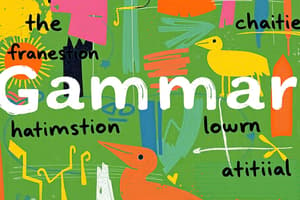Podcast
Questions and Answers
What do verb tenses show?
What do verb tenses show?
- The duration of an action (correct)
- The subject of the sentence
- The location of the action
- The number of people involved in an action
How many main verb tenses are there in English?
How many main verb tenses are there in English?
- Seven
- Nine
- Three (correct)
- Five
What are the additional aspects that give extra details about verb tenses?
What are the additional aspects that give extra details about verb tenses?
- Simple tense, perfect tense, continuous tense, and perfect continuous tense (correct)
- Simple tense, complex tense, continuous tense, and perfect continuous tense
- Past tense, present tense, future tense, and conditional tense
- Perfect tense, continuous tense, complex tense, and progressive tense
Which is the standard tense in English?
Which is the standard tense in English?
What do grammatical aspects add to verb tenses?
What do grammatical aspects add to verb tenses?
वैदिक ऋग्वेद के माने जाने वाले समय के बारे में क्या कहा गया है?
वैदिक ऋग्वेद के माने जाने वाले समय के बारे में क्या कहा गया है?
किस समय पर प्राचीन संस्कृत का प्रारंभ हुआ?
किस समय पर प्राचीन संस्कृत का प्रारंभ हुआ?
किस भाषा से प्राचीन संस्कृत का विकास हुआ?
किस भाषा से प्राचीन संस्कृत का विकास हुआ?
'रिग्वेद' का समय क्या है?
'रिग्वेद' का समय क्या है?
'प्राचीन संस्कृत' की मुलाकात किसके साथ हुई?
'प्राचीन संस्कृत' की मुलाकात किसके साथ हुई?
Study Notes
Verb Tenses and Vedic Sanskrit Grammar
- Verb tenses indicate the time an action took place: past, present, or future.
- There are 12 main verb tenses in English, including the past, present, and future, along with grammatical aspects.
- The grammatical aspects include simple tense, perfect tense, continuous tense, and perfect continuous tense.
- The present tense is the standard tense in English, usually the root form of the verb.
- Vedic Sanskrit is the oldest attested descendant of Proto-Indo-Aryan language, used in religious hymns called the Vedas, particularly the Ṛg-Veda.
- The Vedic language was purely spoken before the introduction of writing and inherited an elaborate system of morphology from its ultimate-parent, the Proto-Indo-European language.
- Vedic Sanskrit grammar differs greatly from later Classical Sanskrit, with a complex inherited morphology that simplified over time.
- The language descended from Proto-Indo-Aryan, entering the Indian subcontinent around 1800–1500 BCE.
- Vedic hymns are estimated to have been composed between 1500 and 1000 BCE, with the language of each hymn fixed at the time of its oral composition.
- The popular speech evolved over the centuries, making Vedic hymns increasingly inaccessible, leading to a rigorous linguistic tradition to "arrest" language change.
- The Vedic language's grammar is preserved in Sanskrit more than in other kindred languages such as Ancient Greek or Latin.
- The Vedic language was used in a religious canon, establishing a literary tradition, before evolving over time.
Studying That Suits You
Use AI to generate personalized quizzes and flashcards to suit your learning preferences.
Description
Learn about verb tenses and grammatical aspects in English, including how they indicate the timing and duration of actions. Explore examples and explanations for the twelve main verb tenses in English.





